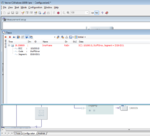sunil_kasar
Newbie level 6
Hello all,
I wrote code for CAN message transmission using STM32F429ZI board. Message is not getting transferred. It is displaying only error frames in CANanalyzer. Please suggest me solution for this problem. I have attached the code for your convenience. Even I have attached a snapshot of CAN analyzer result.
Thanking you.
I wrote code for CAN message transmission using STM32F429ZI board. Message is not getting transferred. It is displaying only error frames in CANanalyzer. Please suggest me solution for this problem. I have attached the code for your convenience. Even I have attached a snapshot of CAN analyzer result.
Thanking you.
Code:
#include "stm32f4xx.h"
uint32_t SysClk;
uint32_t HClk;
uint32_t PClk1;
uint32_t PClk2;
int main(void)
{
GPIO_InitTypeDef GPIO_InitStructure;
RCC_ClocksTypeDef RCC_Clocks;
CAN_InitTypeDef CAN_InitStructure;
CAN_FilterInitTypeDef CAN_FilterInitStructure;
CanTxMsg TxMessage;
RCC_GetClocksFreq(&RCC_Clocks);
SysClk = RCC_Clocks.SYSCLK_Frequency;
HClk = RCC_Clocks.HCLK_Frequency;
PClk1 = RCC_Clocks.PCLK1_Frequency;
PClk2 = RCC_Clocks.PCLK2_Frequency;
/* CAN GPIOs configuration **************************************************/
/* Enable GPIO clock */
//RCC_AHB1PeriphClockCmd(RCC_AHB1Periph_GPIOD, ENABLE);
RCC_AHB1PeriphClockCmd(RCC_AHB1Periph_GPIOB, ENABLE);
/* Connect CAN pins */
// GPIO_PinAFConfig(GPIOD, GPIO_PinSource0, GPIO_AF_CAN1);
// GPIO_PinAFConfig(GPIOD, GPIO_PinSource1, GPIO_AF_CAN1);
GPIO_PinAFConfig(GPIOB, GPIO_PinSource8, GPIO_AF_CAN1);
GPIO_PinAFConfig(GPIOB, GPIO_PinSource9, GPIO_AF_CAN1);
/* Configure CAN RX and TX pins */
/*
GPIO_InitStructure.GPIO_Pin = GPIO_Pin_0 | GPIO_Pin_1;
GPIO_InitStructure.GPIO_Mode = GPIO_Mode_AF;
GPIO_InitStructure.GPIO_Speed = GPIO_Speed_50MHz;
GPIO_InitStructure.GPIO_OType = GPIO_OType_PP;
GPIO_InitStructure.GPIO_PuPd = GPIO_PuPd_UP;
GPIO_Init(GPIOD, &GPIO_InitStructure);
*/
GPIO_InitStructure.GPIO_Pin = GPIO_Pin_8 | GPIO_Pin_9;
GPIO_InitStructure.GPIO_Mode = GPIO_Mode_AF;
GPIO_InitStructure.GPIO_Speed = GPIO_Speed_50MHz;
GPIO_InitStructure.GPIO_OType = GPIO_OType_PP;
GPIO_InitStructure.GPIO_PuPd = GPIO_PuPd_NOPULL;//GPIO_PuPd_UP;
GPIO_Init(GPIOB, &GPIO_InitStructure);
/* CAN configuration ********************************************************/
/* Enable CAN clock */
RCC_APB1PeriphClockCmd(RCC_APB1Periph_CAN1, ENABLE);
/* CAN register init */
CAN_DeInit(CAN1);
CAN_StructInit(&CAN_InitStructure);
/* CAN cell init */
CAN_InitStructure.CAN_TTCM = DISABLE;
CAN_InitStructure.CAN_ABOM = DISABLE;
CAN_InitStructure.CAN_AWUM = DISABLE;
CAN_InitStructure.CAN_NART = DISABLE;
CAN_InitStructure.CAN_RFLM = DISABLE;
CAN_InitStructure.CAN_TXFP = DISABLE;
CAN_InitStructure.CAN_Mode = CAN_Mode_Normal;
/* quanta 1+6+7 = 14, 14 * 3 = 42, 42000000 / 42 = 1000000 */
/* CAN Baudrate = 1Mbps (CAN clocked at 42 MHz) Prescale = 3 */
/* Requires a clock with integer division into APB clock */
CAN_InitStructure.CAN_SJW = CAN_SJW_1tq; // 1+6+7 = 14, 1+14+6 = 21, 1+15+5 = 21
CAN_InitStructure.CAN_BS1 = CAN_BS1_6tq;
CAN_InitStructure.CAN_BS2 = CAN_BS2_7tq;
CAN_InitStructure.CAN_Prescaler = RCC_Clocks.PCLK1_Frequency / (14 * 1000000); // quanta by baudrate
CAN_Init(CAN1, &CAN_InitStructure);
/* CAN filter init */
CAN_FilterInitStructure.CAN_FilterNumber = 0; // CAN1 [ 0..13]
CAN_FilterInitStructure.CAN_FilterMode = CAN_FilterMode_IdMask; // IdMask or IdList
CAN_FilterInitStructure.CAN_FilterScale = CAN_FilterScale_32bit; // 16 or 32
CAN_FilterInitStructure.CAN_FilterIdHigh = 0x0000; // Everything, otherwise 11-bit in top bits
CAN_FilterInitStructure.CAN_FilterIdLow = 0x0000;
CAN_FilterInitStructure.CAN_FilterMaskIdHigh = 0x0000;
CAN_FilterInitStructure.CAN_FilterMaskIdLow = 0x0000;
CAN_FilterInitStructure.CAN_FilterFIFOAssignment = CAN_FIFO0; // Rx
CAN_FilterInitStructure.CAN_FilterActivation = ENABLE;
CAN_FilterInit(&CAN_FilterInitStructure);
// transmit */
TxMessage.StdId = 0x123;
TxMessage.ExtId = 0x00;
TxMessage.RTR = CAN_RTR_DATA;
TxMessage.IDE = CAN_ID_STD;
TxMessage.DLC = 8;
TxMessage.Data[0] = 0x02;
TxMessage.Data[1] = 0x11;
TxMessage.Data[2] = 0x11;
TxMessage.Data[3] = 0x11;
while(1) // Do not want to exit
{
volatile uint32_t i;
static int j = 0;
uint8_t TransmitMailbox = 0;
TxMessage.Data[4] = (j >> 0) & 0xFF; // Cycling
TxMessage.Data[5] = (j >> 8) & 0xFF;
TxMessage.Data[6] = (j >> 16) & 0xFF;
TxMessage.Data[7] = (j >> 24) & 0xFF;
j++;
TransmitMailbox = CAN_Transmit(CAN1, &TxMessage);
i = 0;
while((CAN_TransmitStatus(CAN1, TransmitMailbox) != CANTXOK) && (i != 0xFFFFFF)) // Wait on Transmit
{
i++;
}
}
}
#ifdef USE_FULL_ASSERT
/**
* @brief Reports the name of the source file and the source line number
* where the assert_param error has occurred.
* @param file: pointer to the source file name
* @param line: assert_param error line source number
* @retval None
*/
void assert_failed(uint8_t* file, uint32_t line)
{
/* User can add his own implementation to report the file name and line number,
ex: printf("Wrong parameters value: file %s on line %d\r\n", file, line) */
/* Infinite loop */
while (1)
{
}
}
#endifAttachments
Last edited by a moderator:

